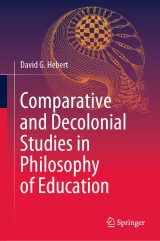Details

Comparative and Decolonial Studies in Philosophy of Education
|
139,09 € |
|
| Verlag: | Springer |
| Format: | |
| Veröffentl.: | 18.03.2023 |
| ISBN/EAN: | 9789819901395 |
| Sprache: | englisch |
Dieses eBook enthält ein Wasserzeichen.
Beschreibungen
<p>This book introduces the educational philosophies of notable African and Asian thinkers who tend to be little recognized in Europe and North America. It offers specific resources for diversification of higher education curricula. </p>
<p>The book expands the philosophy of education, in clear language, to include ideas of major non-western educational thinkers who are little discussed in previous publications. It includes critical analysis of non-western concepts and consideration of their relevance to schools worldwide. The book features discussions of how the work of Tagore and postcolonial thinkers offers diverse visions that increasingly inspire a decolonizing approach to education. </p>
<p>This book offers a unique emphasis on how a decolonized philosophy of education can especially enable a rethinking of approaches to education in arts and humanities subjects.</p><br>
<p>The book expands the philosophy of education, in clear language, to include ideas of major non-western educational thinkers who are little discussed in previous publications. It includes critical analysis of non-western concepts and consideration of their relevance to schools worldwide. The book features discussions of how the work of Tagore and postcolonial thinkers offers diverse visions that increasingly inspire a decolonizing approach to education. </p>
<p>This book offers a unique emphasis on how a decolonized philosophy of education can especially enable a rethinking of approaches to education in arts and humanities subjects.</p><br>
Why Comparative and Decolonial Studies in Philosophy of Education?.- Cai Yuanpei’s Vision of Aesthetic Education and his Legacy in China.- Comparison of Self-reflection in Humboldtian <i>Bildung</i> and the Kyoto School: Rethinking Assumptions on Reflection in <i>OECD 2030.- </i>A Philosophical Perspective on the Purpose of Education in Indonesia.- <i>Sikolohiyang Pilipino:</i> Implications for Formal and Informal Learning Institutions and Settings in the Philippines.- Beyond Education: A Comparison of Tagore and Hu Shih’s Educational Philosophies.- Lessons from Ubuntu for Moral Education .- <i>Omoluabi </i>and <i>Asabiyyah</i> Philosophies: Afro-Arabian Perspectives on Inclusive Education Policy in Nigeria.- The “happy island” of Polish Music Education: Self-Orientalization of Educational Philosophies in Post-Soviet Europe.- Advancing and Applying Comparative and Decolonial Studies in Philosophy of Education.- Afterword: Philosophical Remarks on Decolonizing Philosophy of Education. <br><br>
<b>David G. Hebert</b>, PhD is a Professor with the Faculty of Education at Western Norway University of Applied Sciences, Bergen, and Honorary Professor with the Education University of Hong Kong. He teaches for Bergen Summer Research School and has grant funding from various sources for international projects in Europe, Asia, and Africa. He has published nine academic books and the present volume was developed by two cohorts of his doctoral course <i>PhD911: Non-Western Educational Philosophy and Policy</i>.
<p>This book introduces the educational philosophies of notable African and Asian thinkers who tend to be little recognized in Europe and North America. It offers specific resources for diversification of higher education curricula. </p>
<p>The book expands the philosophy of education, in clear language, to include ideas of major non-western educational thinkers who are little discussed in previous publications. It includes critical analysis of non-western concepts and consideration of their relevance to schools worldwide. The book features discussions of how the work of Tagore and postcolonial thinkers offers diverse visions that increasingly inspire a decolonizing approach to education. </p>
<p>This book offers a unique emphasis on how a decolonized philosophy of education can especially enable a rethinking of approaches to education in arts and humanities subjects.</p><br>
<p>The book expands the philosophy of education, in clear language, to include ideas of major non-western educational thinkers who are little discussed in previous publications. It includes critical analysis of non-western concepts and consideration of their relevance to schools worldwide. The book features discussions of how the work of Tagore and postcolonial thinkers offers diverse visions that increasingly inspire a decolonizing approach to education. </p>
<p>This book offers a unique emphasis on how a decolonized philosophy of education can especially enable a rethinking of approaches to education in arts and humanities subjects.</p><br>
Expands the philosophy of education to include ideas of major non-western educational thinkers Analyzes non-western concepts critically and considers their relevance to schools worldwide Rethinks approaches to education in arts and humanities through decolonized philosophy of education
Diese Produkte könnten Sie auch interessieren:

Bildungssysteme im Vergleich. Deutschland, die DDR, Schottland, Finnland und Japan

von: GRIN Verlag (Hrsg.), Rabea Hotaki, Jenny Braun, Veronika Amtmann

29,99 €

Die Bedeutung der Bewegung im Grundschulalter unter dem Aspekt der Motorik

von: Christopher Schuh

36,99 €

Cybermobbing in der Schule. Interventions- und Präventionsmaßnahmen, Erscheinungsformen sowie Ursachen

von: Katharina Zyban

13,99 €













